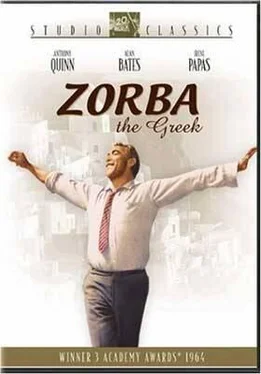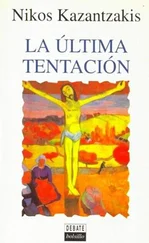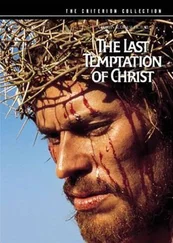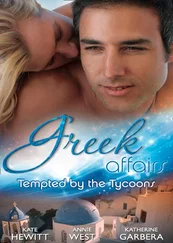Nikos Kazantzakis - Zorba The Greek
Здесь есть возможность читать онлайн «Nikos Kazantzakis - Zorba The Greek» весь текст электронной книги совершенно бесплатно (целиком полную версию без сокращений). В некоторых случаях можно слушать аудио, скачать через торрент в формате fb2 и присутствует краткое содержание. Жанр: Современная проза, на английском языке. Описание произведения, (предисловие) а так же отзывы посетителей доступны на портале библиотеки ЛибКат.
- Название:Zorba The Greek
- Автор:
- Жанр:
- Год:неизвестен
- ISBN:нет данных
- Рейтинг книги:3 / 5. Голосов: 1
-
Избранное:Добавить в избранное
- Отзывы:
-
Ваша оценка:
- 60
- 1
- 2
- 3
- 4
- 5
Zorba The Greek: краткое содержание, описание и аннотация
Предлагаем к чтению аннотацию, описание, краткое содержание или предисловие (зависит от того, что написал сам автор книги «Zorba The Greek»). Если вы не нашли необходимую информацию о книге — напишите в комментариях, мы постараемся отыскать её.
Zorba The Greek — читать онлайн бесплатно полную книгу (весь текст) целиком
Ниже представлен текст книги, разбитый по страницам. Система сохранения места последней прочитанной страницы, позволяет с удобством читать онлайн бесплатно книгу «Zorba The Greek», без необходимости каждый раз заново искать на чём Вы остановились. Поставьте закладку, и сможете в любой момент перейти на страницу, на которой закончили чтение.
Интервал:
Закладка:
24
WE WENT in silence through the narrow streets of the village. There were no lights in the houses and they cast black shadows in the night. Somewhere a dog was barking, and a bullock sighed. From afar the wind carried to us the joyful tinkling of the lyre bells, dancing like the playful waters of a fountain.
"Zorba," I said, to break our heavy silence, "what is this wind, the Notus?"
But Zorba marched on in front, holding the parrot's cage like a lantern, and made no reply. When we came to the beach he turned round.
"Are you hungry, boss?" he asked
"No, I'm not hungry, Zorba."
"Are you sleepy?"
"No."
"Neither am I. Shall we sit down on the pebbles for a bit? I've got something to ask you."
We were both tired, but neither of us wanted to sleep. We were unwilling to lose the bitterness of those last few hours, and sleep seemed to us like running away in the hour of danger. We were ashamed of going to bed.
We sat down by the sea. Zorba put the cage between his knees and remained silent for a time. A disturbing constellation appeared in the sky from behind the mountain, a monster with countless eyes and a spiral tail. From time to time a star detached itself and fell away.
Zorba looked at the sky with open mouth in a sort of ecstasy, as though he were seeing it for the first time.
"What can be happening up there?" he murmured.
A moment later he decided to speak.
"Can you tell me, boss," he said, and his voice sounded deep and earnest in the warm night, "what all these things mean? Who made them all? And why? And, above all"-here Zorba's voice trembled with anger and fear-"why do people die?"
"I don't know, Zorba," I replied, ashamed, as if I had been asked the simplest thing, the most essential thing, and was unable to explain it.
"You don't know!" said Zorba in round-eyed astonishment, just like his expression the night I had confessed I could not dance.
He was silent a moment and then suddenly broke out.
"Well, all those damned books you read-what good are they? Why do you read them? If they don't tell you that, what do they tell you?"
"They tell me about the perplexity of mankind, who can give no answer to the question you've just put me, Zorba."
"Oh, damn their perplexity!" he cried, tapping his foot on the ground in exasperation.
The parrot started up at these noises.
"Canavaro! Canavaro!" he called, as if for help.
"Shut up! You, too!" shouted Zorba, banging on the cage with his fist.
He turned back to me.
"I want you to tell me where we come from and where we are going to. During all those years you've been burning yourself up consuming their black books of magic, you must have chewed over about fifty tons of paper! What did you get out of them?"
There was so much anguish in his voice that my heart was wrung with distress. Ah! how I would have liked to be able to answer him!
I felt deep within me that the highest point a man can attain is not Knowledge, or Virtue, or Goodness, or Victory, but something even greater, more heroic and more despairing: Sacred Awe!
"Can't you answer?" asked Zorba anxiously.
I tried to make my companion understand what I meant by Sacred Awe.
"We are little grubs, Zorba, minute grubs on the small leaf of a tremendous tree. This small leaf is the earth. The other leaves are the stars that you see moving at night. We make our way on this little leaf examining it anxiously and carefully. We smell it; it smells good or bad to us. We taste it and find it eatable. We beat on it and it cries out like a living thing.
"Some men-the more intrepid ones-reach the edge of the leaf. From there we stretch out, gazing into chaos. We tremble. We guess what a frightening abyss lies beneath us. In the distance we can hear the noise of the other leaves of the tremendous tree, we feel the sap rising from the roots to our leaf and our hearts swell. Bent thus over the awe-inspiring abyss, with all our bodies and all our souls, we tremble with terror. From that moment begins…"
I stopped. I wanted to say "from that moment begins poetry," but Zorba would not have understood. I stopped.
"What begins?" asked Zorba's anxious voice. "Why did you stop?"
"… begins the great danger, Zorba. Some grow dizzy and delirious, others are afraid; they try to find an answer to strengthen their hearts, and they say: 'God!' Others again, from the edge of the leaf, look over the precipice calmly and bravely and say: 'I like it.'"
Zorba reflected for a long time. He was straining to understand.
"You know," he said at last, "I think of death every second. I look at it and I'm not frightened. But never, never, do I say I like it. No, I don't like it at all! I don't agree!"
He was silent, but soon broke out again.
"No, I'm not the sort to hold out my neck to Charon like a sheep and say: 'Cut my throat, Mr. Charon, please: I want to go straight to Paradise!'"
I listened to Zorba in perplexity. Who was the sage who tried to teach his disciples to do voluntarily what the law ordered should be done? To say "yes" to necessity and change the inevitable into something done of their own free will? That is perhaps the only human way to deliverance. It is a pitiable way, but there is no other.
But what of revolt? The proud, quixotic reaction of mankind to conquer Necessity and make external laws conform to the internal laws of the soul, to deny all that is and create a new world according to the laws of one's own heart, which are contrary to the inhuman laws of nature-to create a new world which is purer, better and more moral than the one that exists?
Zorba looked at me, saw that I had no more to say to him, took up the cage carefully so that he should not wake the parrot, placed it by his head and stretched out on the pebbles.
"Good night, boss!" he said. "That's enough."
A strong south wind was blowing from Africa. It was making the vegetables and fruits and Cretan breasts all swell and grow. I felt it on my forehead, lips and neck; and like a fruit my brain cracked and swelled.
I could not and would not sleep. I thought of nothing. I just felt something, someone growing to maturity inside me in the warm night. I lived lucidly through a most surprising experience: I saw myself change. A thing that usually happens only in the most obscure depths of our bowels was this time occurring in the open, before my eyes. Crouched by the sea, I watched this miracle take place.
The stars grew dim, the sky grew light and against this luminous background appeared, as if delicately traced in ink, the mountains, trees and gulls.
Dawn was breaking.
Several days went by. The corn had ripened and the heavy ears were hanging down with the weight of the grain. On the olive trees the cicadas sawed the air, and brilliant insects hummed in the burning light. Vapor was rising from the sea.
Zorba went off silently at dawn every day to the mountain. The work of installing the overhead line was nearing an end. The pylons were all in place, the cable was stretched ready and the pulleys fixed. Zorba came back from work at dusk, worn out. He lit the fire, made the evening meal, and we ate. We took care not to arouse the demons that were sleeping within us-death and fear; we never talked of the widow, or Dame Hortense, or God. Silently we gazed out over the sea.
Because of Zorba's silence, the eternal but vain questions rose up once more within me. Once more my breast was filled with anguish. What is this world? I wondered. What is its aim and in what way can we help to attain it during our ephemeral lives? The aim of man and matter is to create joy, according to Zorba-others would say "to create spirit," but that comes to the same thing on another plane. But why? With what object? And when the body dissolves, does anything at all remain of what we have called the soul? Or does nothing remain, and does our unquenchable desire for immortality spring, not from the fact that we are immortal, but from the fact that during the short span of our life we are in the service of something immortal?
Читать дальшеИнтервал:
Закладка:
Похожие книги на «Zorba The Greek»
Представляем Вашему вниманию похожие книги на «Zorba The Greek» списком для выбора. Мы отобрали схожую по названию и смыслу литературу в надежде предоставить читателям больше вариантов отыскать новые, интересные, ещё непрочитанные произведения.
Обсуждение, отзывы о книге «Zorba The Greek» и просто собственные мнения читателей. Оставьте ваши комментарии, напишите, что Вы думаете о произведении, его смысле или главных героях. Укажите что конкретно понравилось, а что нет, и почему Вы так считаете.












